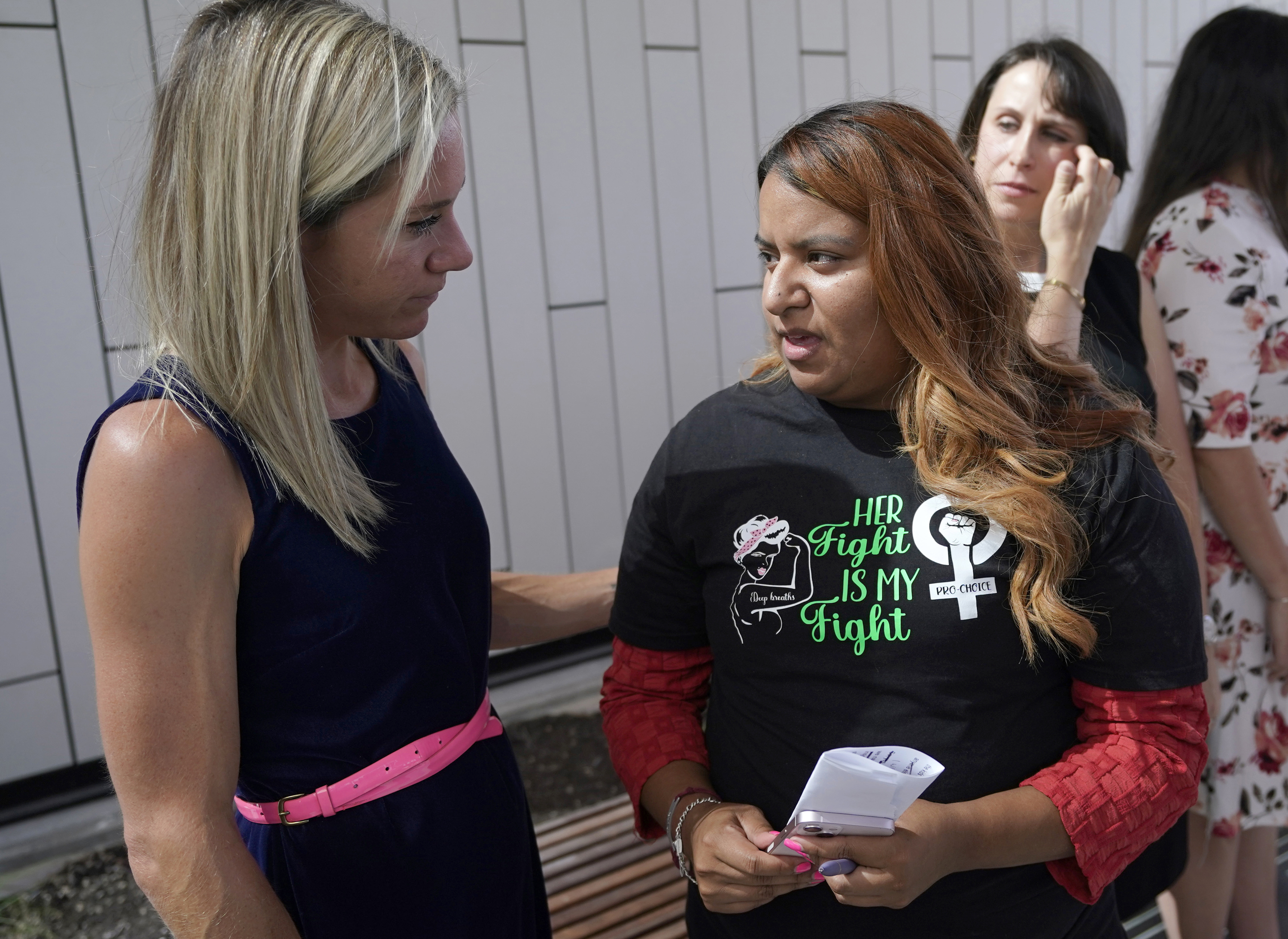A Texas judge on Thursday granted a pregnant woman permission to obtain an abortion in an unprecedented challenge to the state’s ban that took effect after Roe v. Wade was overturned last year.
It was unclear how quickly or whether Kate Cox, a 31-year-old mother of two from the Dallas area, would be able to obtain an abortion. State District Judge Maya Guerra Gamble, an elected Democrat, said she would grant a temporary restraining order that would allow Cox to have an abortion. According to the Center for Reproductive Rights, which filed the lawsuit on Cox's behalf, the judge granted her request from the bench on Thursday.
That decision is likely to be appealed by the state which previously said Cox was not at any more of a risk than other women who give birth. On Thursday afternoon, Texas Attorney General Ken Paxton sent a letter saying, "The TRO granted by the Travis County district judge purporting to allow an abortion to proceed will not insulate hospitals, doctors, or anyone else, from civil and criminal liability for violating Texas’ abortion laws."
Seth Chandler, a law professor at the University of Houston, said he would have concerns as a physician based on both legal issues and Paxton's "apparent zeal" to enforce the state's abortion ban.
Get top local stories in DFW delivered to you every morning. Sign up for NBC DFW's News Headlines newsletter.
"If I were one of the doctors involved here, I would not sleep easy performing that abortion," he said.
"It's kind of the test case to see not only what the law is, but procedurally how it works, how the system handles this," said constitutional law expert David Coale.
Coale said the judge's use of a TRO to allow an otherwise illegal action is unusual. And once it expires, he said it's unclear what could happen.
"You have this order that by its nature can only last for about two weeks. And so that's the law for the next two weeks unless an appellate court gets involved. But what happens after that two weeks? The criminal laws are still there, SB8 is still there, and if the people are serious about bringing claims against the hospitals, they'll say the TRO was wrong," he said.
Cox, a mother of two, had cesarean sections with her previous pregnancies. The Center for Reproductive Rights said Cox learned she was pregnant for a third time in August and was told weeks later that her baby was at high risk for a condition known as trisomy 18, which has a very high likelihood of miscarriage or stillbirth and low survival rates, according to the lawsuit.
Doctors told Cox that if the baby’s heartbeat were to stop, inducing labor would carry a risk of a uterine rupture because of her prior cesareans and that another C-section at full term would endanger her ability to carry another child.
Cox's attorneys told Gamble that she went to an emergency room this week for the fourth time during her pregnancy.
In a brief hearing that Cox and her husband attended via Zoom, Gamble said denying the abortion could result in complications preventing Cox from having another child in the future.
“This law might actually cause her to lose that ability is shocking and would be a genuine miscarriage of justice,” Gamble said.

“I do not want to continue the pain and suffering that has plagued this pregnancy or continue to put my body or my mental health through the risks of continuing this pregnancy,” Cox wrote in an editorial published in The Dallas Morning News. “I do not want my baby to arrive in this world only to watch her suffer.”
The lawsuit is believed to be the first of its kind in the nation since the U.S. Supreme Court last year overturned Roe v. Wade, according to the Center for Reproductive Rights, which is representing Cox.
Since that landmark ruling, Texas and 12 other states rushed to ban abortion at nearly all stages of pregnancy. Opponents have sought to weaken those bans — including an ongoing Texas challenge over whether the state's law is too restrictive for women with pregnancy complications — but until now, a woman has not gone to court seeking approval for an immediate abortion.
The lawsuit was filed against the Texas attorney general's office, which has defended the ban in court, and the state's medical board. Republican Texas Attorney General Ken Paxton's office has not responded to requests for comment.
Although Texas allows exceptions under the ban, doctors and women have argued that the requirements are so vaguely worded that physicians still won't risk providing abortions, lest they face potential criminal charges or lawsuits.
State officials asked Gamble to deny the request, alleging that Cox does not meet the requirements for an exception to the ban.
“There are no facts pled which demonstrate that Ms. Cox is at any more of a risk, let alone life-threatening than the countless women who give birth every day with similar medical histories,” the state wrote.
Cox is 20 weeks pregnant and has been told by doctors that her baby is likely to be stillborn or live for a week at most, according to the lawsuit filed in Austin. The suit says doctors told her their “hands are tied” under Texas’ abortion ban.
TEXAS ABORTION LAW
The lawsuit was filed a week after the Texas Supreme Court heard arguments about whether the ban is too restrictive for women with pregnancy complications. That case is among the biggest ongoing challenges to abortion bans in the U.S., although a ruling from the all-Republican court may not come for months.
In July, several Texas women gave emotional testimony about carrying babies they knew would not survive and doctors unable to offer abortions despite their spiraling conditions. A judge later ruled that Texas’ ban was too restrictive for women with pregnancy complications, but that decision was swiftly put on hold after the state appealed.
More than 40 women have received abortions in Texas since the ban took effect, according to state health figures, none of which have resulted in criminal charges. There were more than 16,000 abortions in Texas in the five months before the ban taking effect last year.



